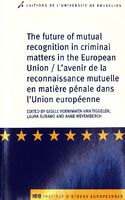The future of mutual recognition in criminal matters in the European Union / L’avenir de la reconnaissance mutuelle en matière pénale dans l’Union européenne
Contributor(s)
Vernimmen-Van Tiggelen, Gisèle (editor)
Surano, Laura (editor)
Weyembergh, Anne (editor)
Adamo, Silvia (editor)
Assenova, Mila (editor)
Braum, Stefan (editor)
Caeiro, Pedro (editor)
Chinova, Margarita (editor)
Conway, Gerard (editor)
De Amicis, Gaetano (editor)
Fidalgo, Sónia (editor)
Filletti, Stefano (editor)
Gatt, Alison (editor)
Ionescu, Diana (editor)
Kert, Robert (editor)
Łazowski, Adam (editor)
Ligeti, Katalin (editor)
Mickevičius, Darius (editor)
Mihelj Plesničar, Mojca (editor)
Mitsilegas, Valsamis (editor)
Poelemans, Maitena (editor)
Santamaria, Veronica (editor)
Language
French; EnglishAbstract
In the EU’s fast-growing Area of Freedom, Security and Justice, the principle of mutual recognition should play a key role in the field of judicial cooperation in criminal matters.Since mutual recognition was enshrined as a cornerstone of judicial cooperation in the EU by the European Council of Tampere in 1999, an increasing number of binding instruments based on this principle have been adopted in the framework of the EU’s Third Pillar.The considerable impact of those instruments on national criminal legal systems has often required a major effort by Member States in adjusting their national legislation so that it complies with the new mechanisms agreed at EU level. What are the real difficulties encountered by Member States in the transposition of these legislative texts into national law and, even earlier, when the texts are being negotiated within the Council of the EU? What lessons can be learned from the early years of their practical implementation by the competent judicial authorities? And, above all, what will be the future role and scope of the principle of mutual recognition in criminal matters in Europe? The entry into force of the Lisbon Treaty and the adoption of a new multi-annual programme (replacing the Hague Programme) to strengthen the EU’s Area of Freedom, Security and Justice are both pending. In this crucial time of transition and uncertainty, the book seeks to provide answers to the above questions and many other related issues. Through its country by country approach covering the vast majority of the Member States, it intends to provide policymakers, practitioners, academics and researchers with a comprehensive analysis of the problems that have emerged and the solutions envisaged by each State in their implementation of mutual recognition instruments. The country chapters are followed by a final EU-wide analysis that seeks to identify common themes and obstacles and to consider future options and possible scenarios. The whole study, based on in-depth research combined with interviews conducted with hundreds of practitioners and experts from across the EU, amounts to a remarkable team performance carried out together with academics and researcher members of ECLAN (European Criminal Law Academic Network).
Keywords
European UnionOCN
742429550Publisher
Editions de l'Université de BruxellesPublisher website
http://www.editions-ulb.be/en/Publication date and place
Bruxelles, 2009Series
Études européennes,Classification
Criminal justice law


 Download
Download